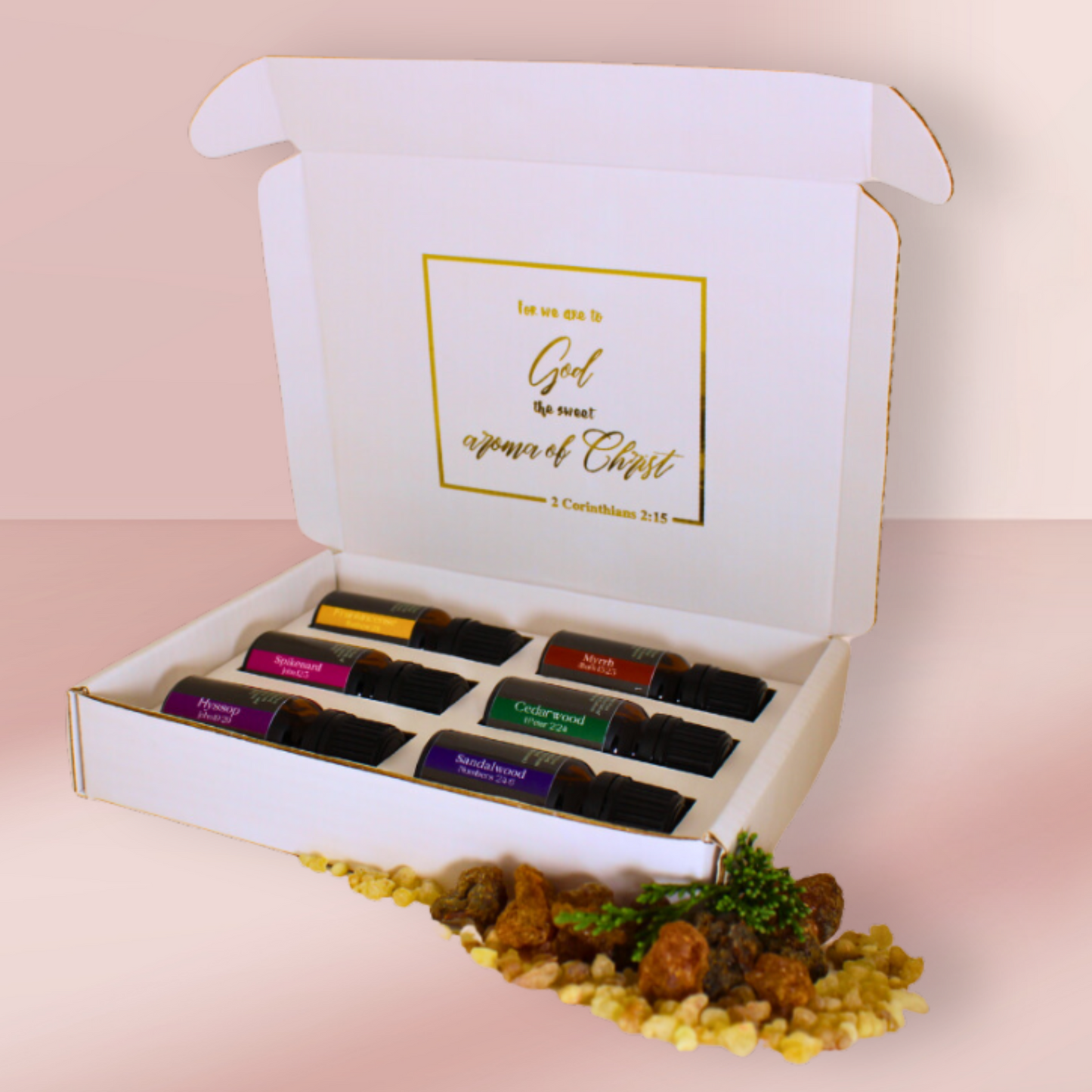
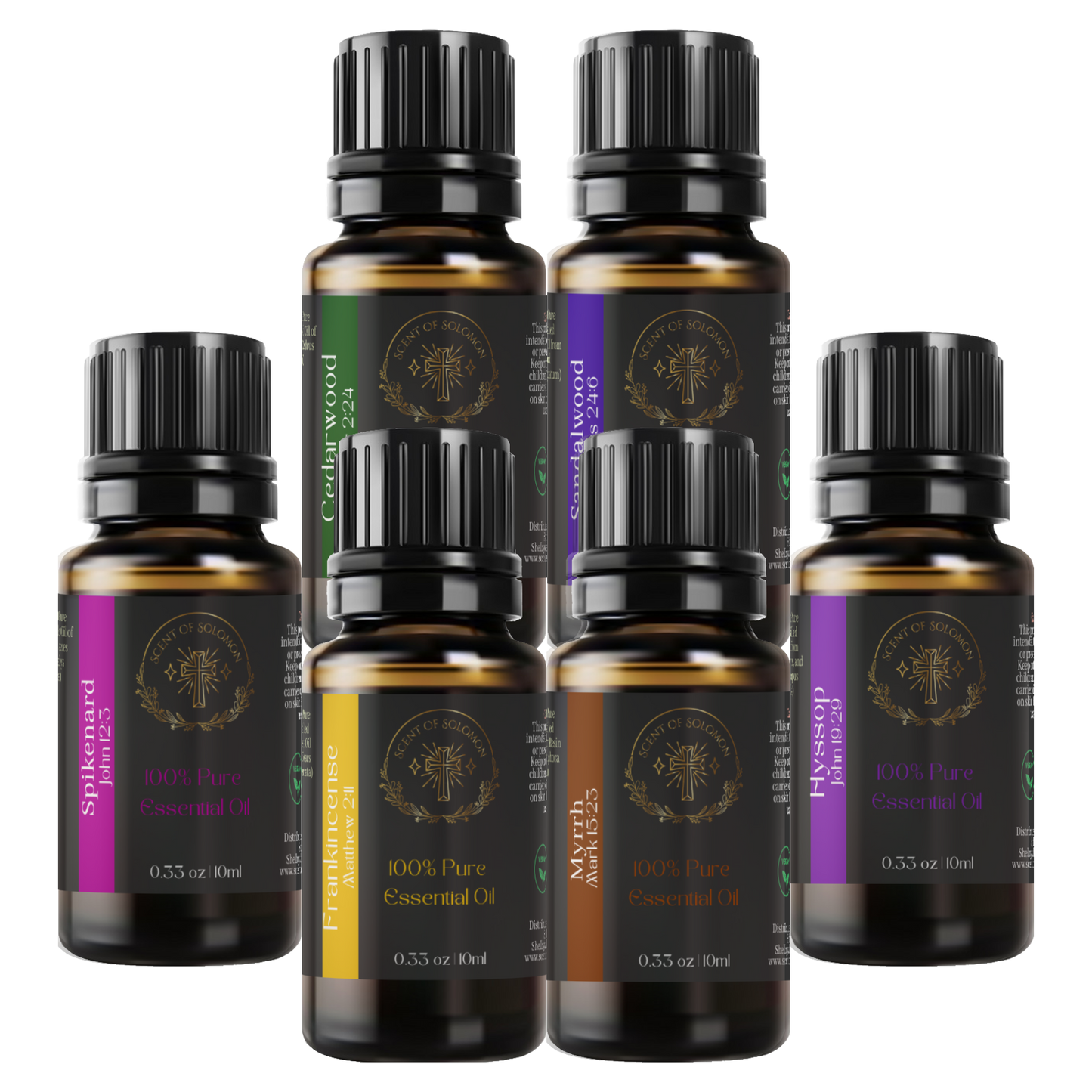
Safe & Secure Checkout
100% Pure & All Natural
30-Day Money Back Guarantee
Shipped & Sold from USA
Fast Shipping & Easy Returns
GC/MS Tested
OVER 1,000 Happy Customers
Safe & Secure Checkout
100% Pure & All Natural
30-Day Money Back Guarantee
Shipped & Sold from USA
Fast Shipping & Easy Returns
GC/MS Tested
OVER 1,000 Happy Customers
Safe & Secure Checkout
100% Pure & All Natural
30-Day Money Back Guarantee
Shipped & Sold from USA
Fast Shipping & Easy Returns
GC/MS Tested
OVER 1,000 Happy Customers
Safe & Secure Checkout
100% Pure & All Natural
30-Day Money Back Guarantee
Shipped & Sold from USA
Fast Shipping & Easy Returns
GC/MS Tested
OVER 1,000 Happy Customers
Curated by Scripture
Discover the six aromas of the Gospel
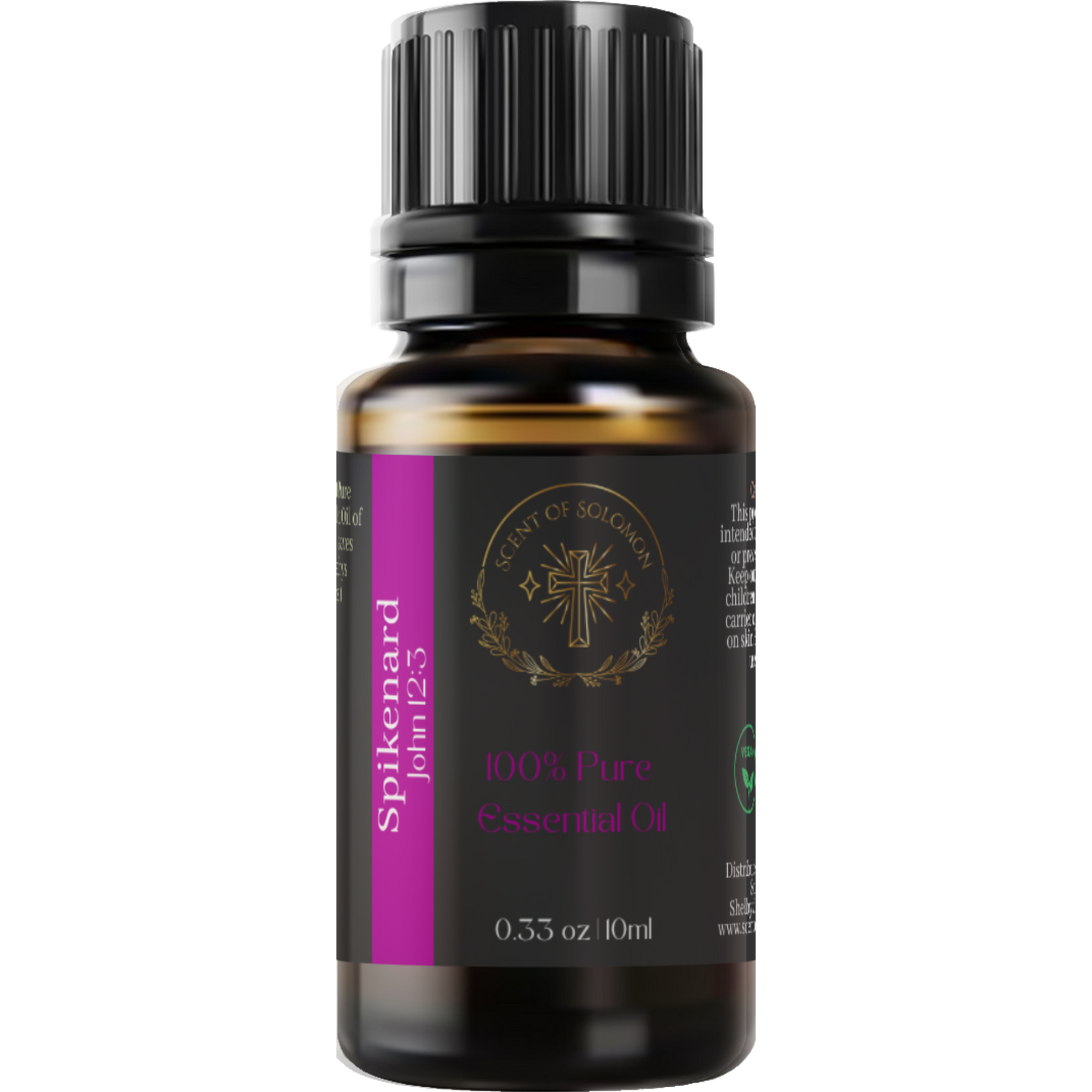
The Oil of Extravagant Love
"Then Mary took a pound of very costly oil of spikenard, anointed the feet of Jesus, and wiped His feet with her hair. And the house was filled with the fragrance of the oil."
— John 12:3
Spikenard, a precious oil valued at nearly a year’s wages, was poured out by Mary of Bethany as a sacrificial act of love, preparing Jesus for His burial. Jesus honored her gift, declaring her devotion would be remembered forever.
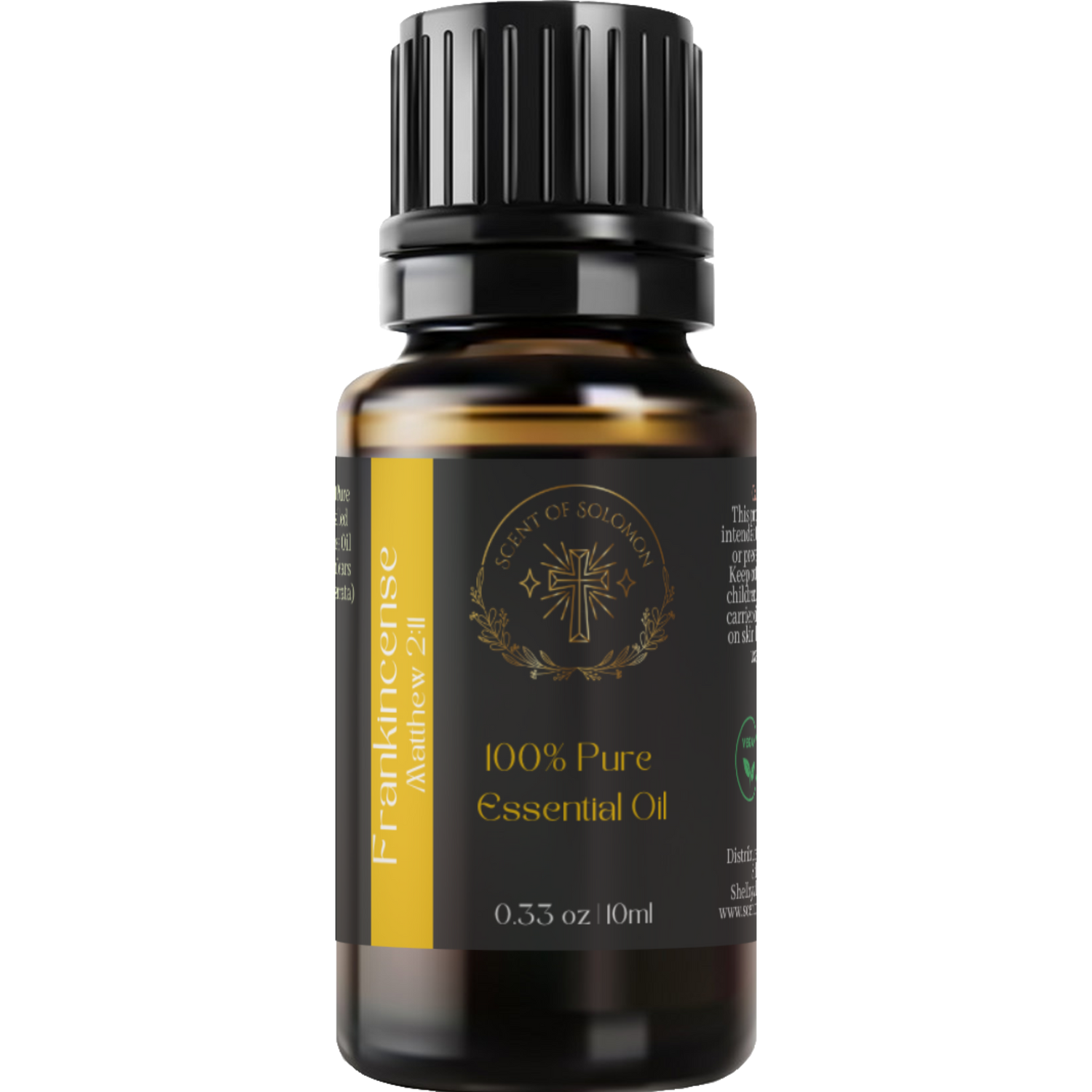
The Aroma of Christ's Divinity
“Nations will come to your light, and kings to the brightness of your dawn... They will bring gold and frankincense and proclaim the praise of the Lord.”
— Isaiah 60:3, 6
Frankincense, offered by the Magi at Jesus’ birth, symbolizes His divine kingship and role as our High Priest. Just as incense rose in the Temple, Jesus’ life was a fragrant offering bridging heaven and earth.
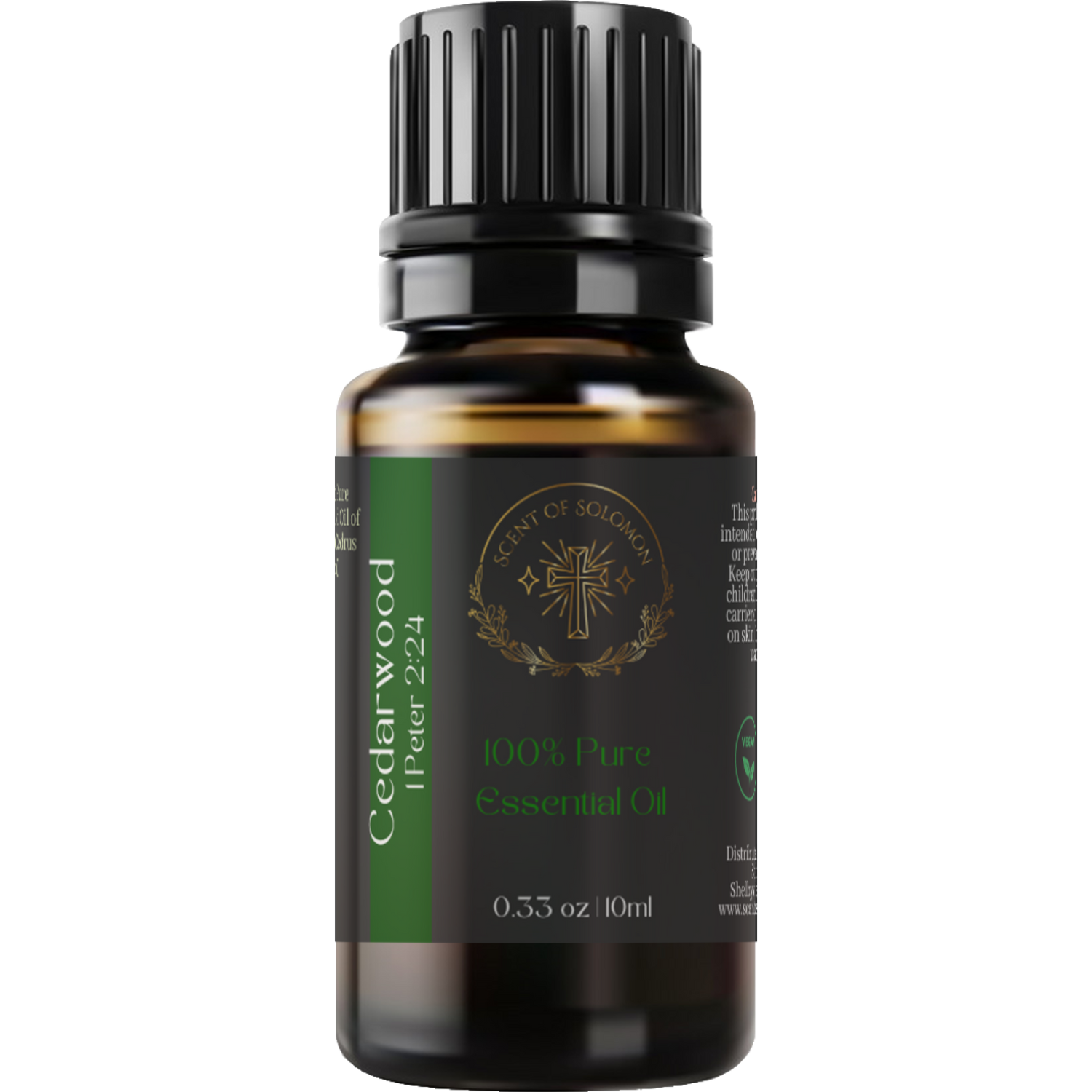
The Strength of the Righteous
“The righteous shall flourish like the palm tree; he shall grow like a cedar in Lebanon.”
— Psalm 92:12
Cedarwood, a symbol of strength and endurance, reflects Jesus’ unwavering faith and righteousness in His mission. As the cedar adorned Solomon’s Temple, Jesus embodied the true and living Temple, offering Himself as the bridge between heaven and earth.
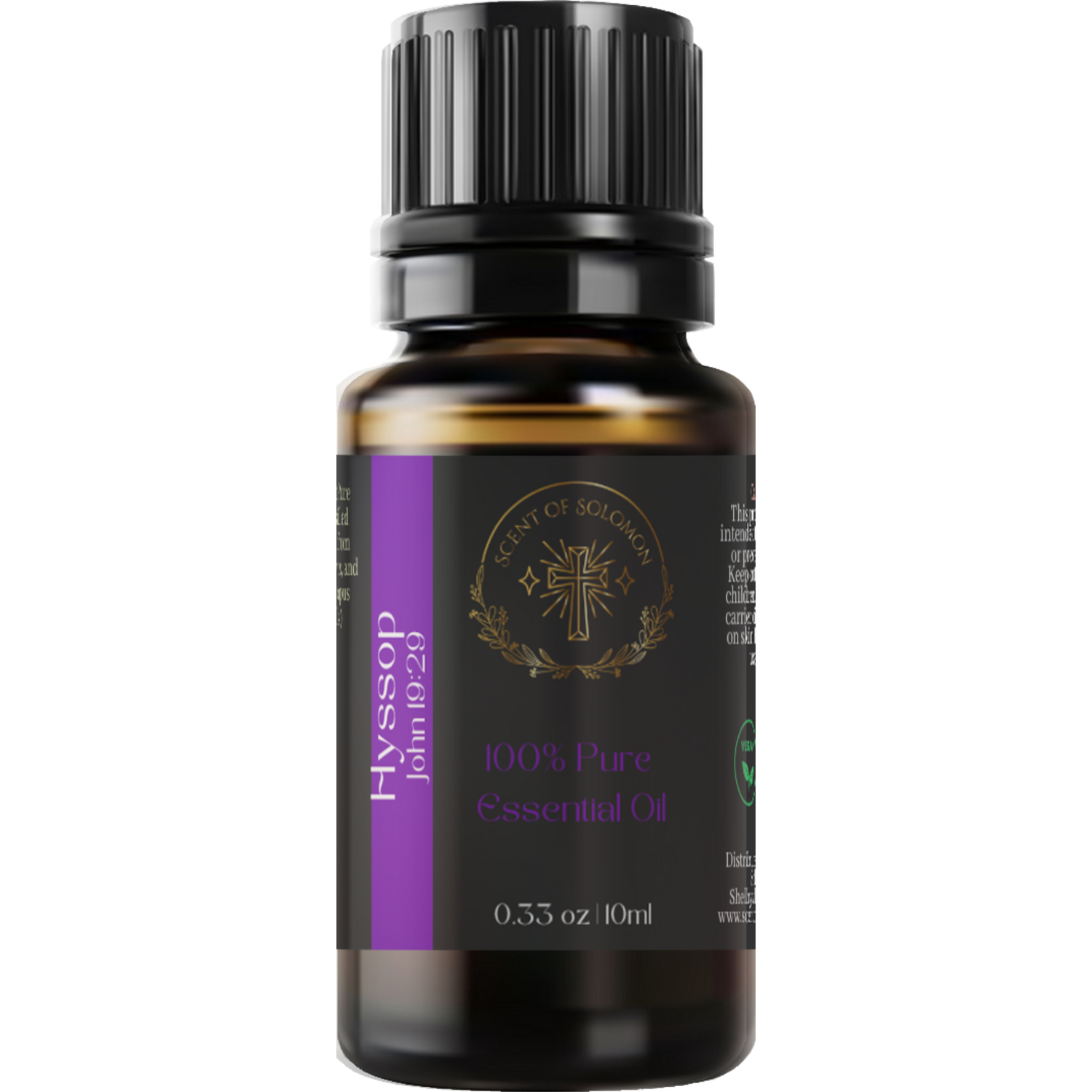
The Herb of Purification
“A jar full of sour wine was sitting there, so they soaked a sponge in the wine, put it on a stalk of hyssop, and lifted it to His lips.”
— John 19:29
Hyssop, used at the crucifixion to lift the sour wine to Jesus’ lips, points to the spiritual purification that His sacrifice brings. As the Passover lamb’s blood was applied with hyssop, Jesus became the final sacrificial Lamb, cleansing us from sin.
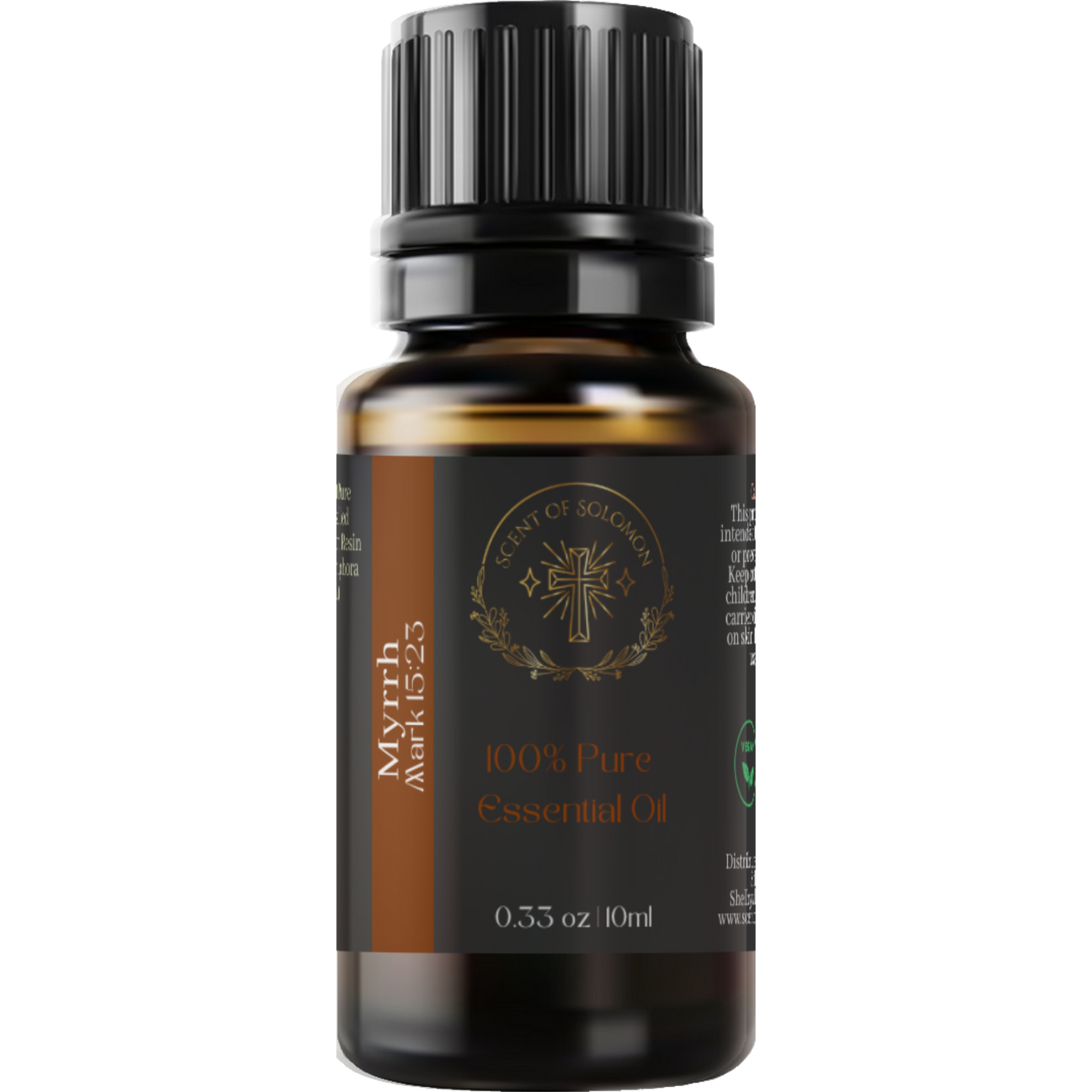
The Oil of Sacrifice
“They offered Him wine mixed with myrrh, but He did not take it.”
— Mark 15:23
From the cradle to the cross, Myrrh was present in both Jesus’ birth and burial. Given by the Magi as a gift foreshadowing His suffering and used in preparing His body for burial, Myrrh reminds us of the ultimate sacrifice Jesus made for the redemption of the world.
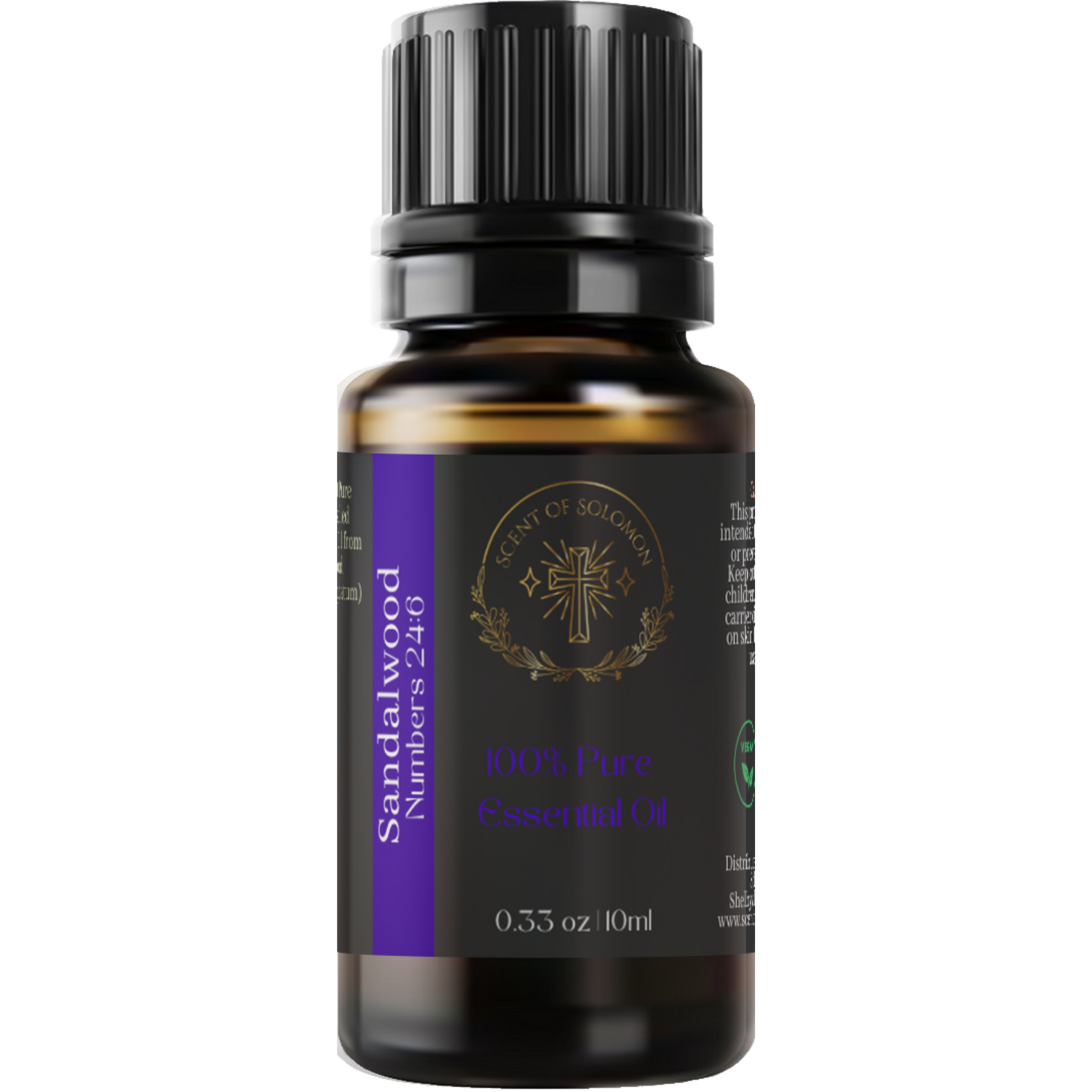
The Balm of Burial and New Life
“Nicodemus brought a mixture of myrrh and aloes, about seventy-five pounds. Taking Jesus’ body, the two of them wrapped it with the spices in strips of linen.”
— John 19:39-40
Aloes, often interpreted as fragrant sandalwood, was used alongside myrrh to prepare Jesus’ body for burial. This rich and grounding aroma symbolizes preservation and foreshadows the new life that His resurrection offers to all who believe.
Faith-Based Uses

Themed Bible Study
Host a themed Bible study centered around the aromas of scripture.
For each oil, pass the bottle around for everyone to smell. Then, hold a discussion about the verses which relate to the fragrance, starting with the quote referenced on the label.
The oils of this set hold incredibly deep symbolic meaning, any one of which could be discussed for hours. These rare fragrances are a novelty which offer a fun a fresh twist to any Bible study session.

Personal Bible Reading
Keep the Oils of the Gospel nearby whenever you read your Bible. Whenever you happen upon a verse which mentions one of them, open the bottle and smell it.
By incorporating your sense of smell into your scriptural reading, you will enjoy a more immersive experience, create more meaningful connections to certain verses, and understand exactly what the biblical authors are talking about when they allude to various fragrances in their writing.

Anointing
Read about instances of anointing in the Bible and then practice anointing with oil in your own life in accordance with scripture.
You can anoint someone who is sick while praying for them, the doorway of a new home or car, or any object, person, or place where you would like to symbolize God's presence and blessing.
Unrivaled quality without sacrifice.
Other brands make you choose—quality or price. We don’t. Our oils offer unmatched purity and authenticity, giving you the best of both worlds without compromise.

|
DoTerra | Young Living | Pure Aroma | |
|---|---|---|---|---|
| High Quality Ingredients | ||||
| No MLM Markups | ||||
| Bottled in USA | ||||
| Christian Messaging | ||||
| Affordable |
Unrivaled quality without sacrifice.
Other brands make you choose—quality or price. We don’t. Our oils offer unmatched purity and authenticity, giving you the best of both worlds without compromise.

|
Others | |
|---|---|---|
| High Quality Ingredients | ||
| No MLM Markups | ||
| Bottled in USA | ||
| Christian Messaging | ||
| Affordable |
You anoint my head with oil; my cup overflows." – Psalm 23:5
"I have perfumed my bed with myrrh, aloes, and cinnamon." – Proverbs 7:17
"Ointment and perfume rejoice the heart." – Proverbs 27:9
"Your name is like perfume poured out." – Song of Solomon 1:3
"A little balm and a little honey, spices and myrrh." – Genesis 43:11
"Drink wine in bowls and anoint yourselves with the finest oils." – Amos 6:6
"And the smoke of the incense, which came with the prayers of the saints, ascended up before God out of the angel's hand." – Revelation 8:4
"Like valleys they spread out, like gardens beside a river, like aloes planted by the Lord, like cedars beside the waters." – Numbers 24:6
"Nard and saffron, calamus and cinnamon..." – Song of Solomon 4:14
"For we are to God the sweet aroma of Christ." – 2 Corinthians 2:15
"God, your God, has set you above your companions by anointing you with the oil of gladness."– Psalm 45:7
You anoint my head with oil; my cup overflows." – Psalm 23:5
"I have perfumed my bed with myrrh, aloes, and cinnamon." – Proverbs 7:17
"Ointment and perfume rejoice the heart." – Proverbs 27:9
"Your name is like perfume poured out." – Song of Solomon 1:3
"A little balm and a little honey, spices and myrrh." – Genesis 43:11
"Drink wine in bowls and anoint yourselves with the finest oils." – Amos 6:6
"And the smoke of the incense, which came with the prayers of the saints, ascended up before God out of the angel's hand." – Revelation 8:4
"Like valleys they spread out, like gardens beside a river, like aloes planted by the Lord, like cedars beside the waters." – Numbers 24:6
"Nard and saffron, calamus and cinnamon..." – Song of Solomon 4:14
"For we are to God the sweet aroma of Christ." – 2 Corinthians 2:15
"God, your God, has set you above your companions by anointing you with the oil of gladness."– Psalm 45:7
Everyday Uses for Essential Oils
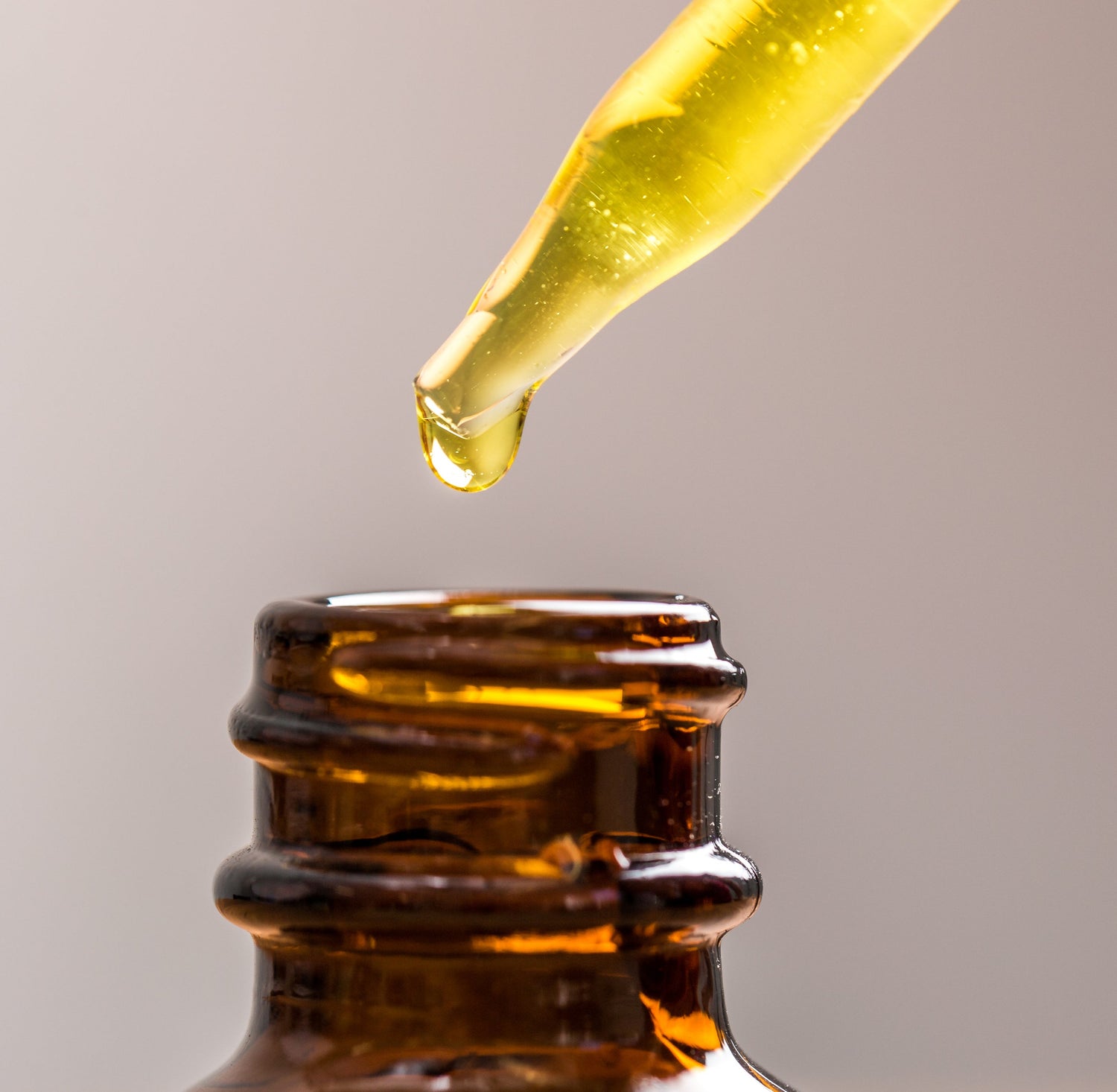
Some Common Questions about Biblical Oils
Why Is Fragrance in the Bible?
Why Is Fragrance in the Bible?
Fragrance plays a profound and multifaceted role in the Bible, with aromatic plants and oils mentioned over 600 times throughout Scripture. These fragrances often carry symbolic, spiritual, and literal significance, enriching the biblical narrative in diverse ways.
Fragrance is frequently used as a metaphor for spiritual concepts—such as prayers rising like incense (Psalm 141:2) or the pleasing aroma of Christ’s sacrifice (2 Corinthians 2:15).
Fragrant oils were used in sacred rituals, anointing ceremonies, and purification rites, symbolizing holiness, consecration, and healing.
Fragrant oils and spices were present at key moments in Jesus’ life and ministry—from the gifts of the Magi at His birth (Matthew 2:11) to His anointing before burial (John 19:39-40).
The fragrances mentioned in the Bible invite us to experience God’s presence more deeply. We encourage you to explore these sacred aromas by reading the verses referenced on our bottles, allowing the fragrance to connect you with Scripture in a tangible and meaningful way.
Why Use Biblical Fragrance?
Why Use Biblical Fragrance?
Scent is one of the most powerful sensory experiences, capable of evoking vivid memories and emotions while forming deep neurological connections. The Bible deliberately uses sensory imagery to create a more lasting impression of its teachings, engaging not just the mind but also the senses.
Experiencing the aromas mentioned in Scripture helps unlock nuances of meaning that can be missed when only reading the text. For example, the scent of frankincense evokes images of worship and intercession, while myrrh recalls both the birth and burial of Jesus.
Engaging with biblical fragrances allows believers to immerse themselves more fully in the biblical narrative, making it a more tangible and memorable spiritual experience.
By using these fragrances—particularly those featured prominently in the Gospel and Old Testament—you can deepen your understanding of Scripture and create lasting sensory connections to key moments in biblical history.
Why do You Include the Free Gifts of the Magi?
Why do You Include the Free Gifts of the Magi?
We provide a free gift of frankincense and myrrh resins with every order of our box sets for 4 reasons:
1. These resins are in the form in which the Virgin Mary most likely received her gifts. This provides a more complete historical context for our customers.
2. These resins are the original Christian gift. Giving them as a gift honors a 2000 year long tradition started by the Wise Men themselves.
3. Burning these resins as incense provides deeper insight into the dozens of Bible verses which discuss burning incense.
4. These resins serve as a symbolic gesture of good faith from us to you.
What Makes These Oils Different from Other Essential Oils?
What Makes These Oils Different from Other Essential Oils?
These oils are carefully curated to reflect specific biblical references and spiritual symbolism. Each oil in this collection connects to a pivotal moment in Jesus’ life, offering not only aromatic beauty but also a deeper spiritual experience. The scriptural ties to these oils make them uniquely meaningful for personal reflection, devotion, and worship.
Are These Oils the Same as What Were Used in Biblical Times?
Are These Oils the Same as What Were Used in Biblical Times?
While modern distillation and extraction methods may differ slightly, these oils are sourced from the same botanical families and regions as those used in biblical times. Great care has been taken to ensure that the oils in this collection reflect the historical and scriptural significance of the original plants and resins mentioned in the Bible.
Is it even OK for Christians to Use Essential Oils?
Is it even OK for Christians to Use Essential Oils?
Yes, absolutely! Essential oils were commonly used by biblical figures for physical, medicinal, and aromatic purposes. Using them in this way is perfectly aligned with Scripture. However, it’s important to approach them with biblical understanding and avoid incorporating New Age practices or attributing mystical powers to the oils. Instead, use them as natural gifts from God that can enhance wellness and serve as an aid in Bible study.
Meeting the growing need for authentic, faith-based oils.
70%
Nearly 70% of pastors and church leaders recognize the significance of anointing oils in biblical tradition
95%
95%of Christian households have never explored essential oils with biblical ties.
70%
Studies show that up to 70% of oils on the market are adulterated or diluted, leaving Christian consumers unsure whether their oils reflect biblical purity.
80%
Over 80% of people associate specific scents with emotional or spiritual memories, making fragrances a powerful trigger for faith-related experiences.

















